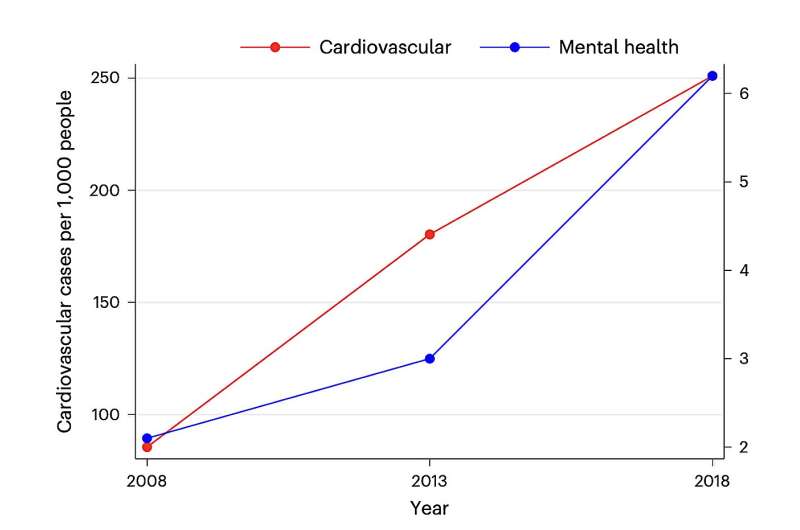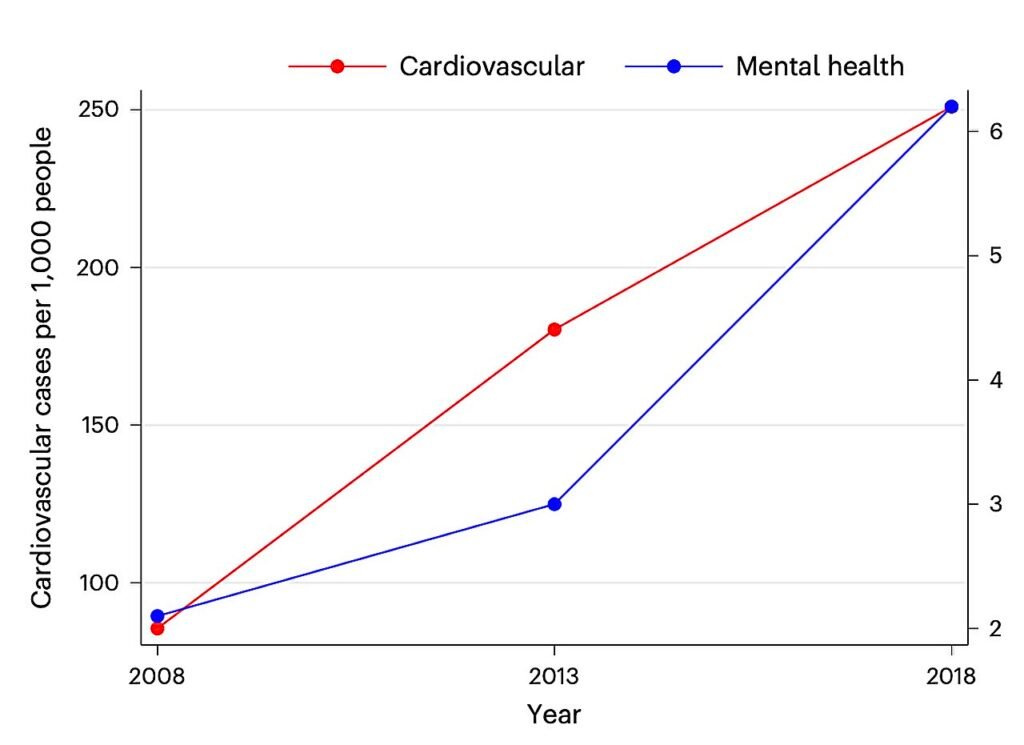
Time trends in disease prevalence. Prevalence of cardiovascular and mental-related diseases in China from the Health Statistics Yearbook 2009-2019. The National Health Commission publishes disease prevalence in five-year intervals for 2008, 2013, and 2018. Source: Agarwal et al. (Nature Mental Health, 2024).
The emergence of computerized trading and fintech platforms has made stock investing easier and more accessible to individuals around the world. This has led to increased stock market participation in many countries, including China.
Between 2000 and 2022, the number of people investing in stocks in China grew from 29.3 million to a staggering 322.6 million. As a result of this surge in investment, stock market fluctuations can have a significant impact on the finances of many individuals and their families.
The sudden changes in wealth and financial hardship caused by these stock market fluctuations can also affect an investor’s mental and physical health. In fact, several recent reports have found a correlation between stock market fluctuations and certain physical and mental problems.
Researchers from the National University of Singapore, Jinan University, Peking University and Sun Yat-sen University recently investigated this potential link further, focusing on the relationship between stock market fluctuations and stress-related emergency department visits in China. Nature Mental Healthfound a trend of increased emergency department visits by individuals with stress-related mental health issues during periods of stock market volatility.
To study the relationship between stock market fluctuations and emergency room visits in China, the research team conducted a statistical analysis of data collected at a major hospital in Beijing over a three-year period from 2009 to 2012. The data, which focused on emergency room visits for reasons potentially related to stress, was analyzed alongside China’s stock market trends over the same period.
“Using daily emergency department visit records from three major hospitals in Beijing from January 1, 2009 to December 31, 2012, we find that a one percentage point decrease in daily market returns (Growing Companies Index) was associated with a 0.185 ( P = 0.040, confidence interval (CI) = 0.009 to 0.361, or 0.7%) increase in cardiovascular disease cases and a 0.020 ( P = 0.060, CI = 0 to -0.041, or 2.5%) increase in mental illness cases on that day,” Sumit Agarwal, Shiyu Chen and their colleagues wrote in the paper.
“Furthermore, a 1 percentage point increase in daily market returns (Growth Companies Index) was associated with a 0.035 ( P = 0.007, CI = 0.010 to 0.059, or 3.3%) increase in alcohol abuse cases on that day.”
Overall, the results of the analysis conducted by Agarwal, Chen and colleagues suggest that stock market shocks had an immediate impact on cardiovascular and psychiatric diseases between 2009 and 2012, as stock market fluctuations were associated with increased emergency room visits for stress-related physical and mental problems. The data the researchers used was more than a decade old, highlighting the need for additional studies using more recent medical and financial data.
“The health effects are highly nonlinear and immediate, and are more pronounced in older adults and men,” Agarwal, Chen and their colleagues wrote.
“In contrast, diseases that are less related to psychological stress (such as infectious and parasitic diseases) are not as affected by market fluctuations. A rough calculation shows that a 10 percentage point decrease in daily market revenue would increase domestic medical costs related to emergency room services by approximately RMB 35 million.”
This recent study may inspire further research investigating the health-related costs of stock price fluctuations in the near future. In their paper, the researchers also suggested that additional research on the topic could be conducted using digital medical data collected during the COVID-19 pandemic, during which more people used online medical services instead of visiting medical facilities.
For more information:
Sumit Agarwal et al., “Association between stock market volatility and stress-related emergency department visits in China” Nature Mental Health (2024). Publication date: 10.1038/s44220-024-00267-5
© 2024 Science X Network
Quote: Study explores link between Chinese stock market fluctuations and emergency department visits (July 5, 2024) Retrieved July 6, 2024 from https://medicalxpress.com/news/2024-07-explores-link-stock-fluctuations-emergency.html
This document is subject to copyright. It may not be reproduced without written permission, except for fair dealing for the purposes of personal study or research. The content is provided for informational purposes only.

